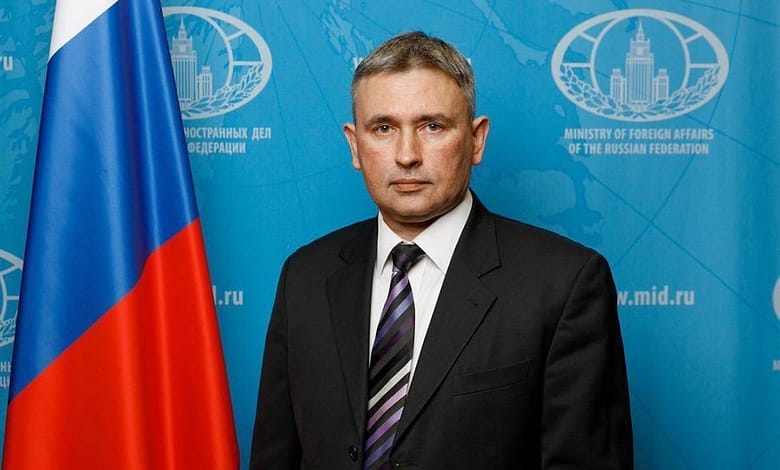The Russian ambassador to Sudan determines the future of rapid support and comments on the parallel government

🔥 Sudan News ! 📰 The Russian ambassador to Sudan determines the future of rapid support and comments on the parallel government
📅 Published on: 2025-03-23 11:25:00
📝 Details:
Follow-up- Al-Zawiya Net- The Russian Ambassador to Sudan Andrei Gore Gifvic said that the recent victories of the Sudanese army in the center of the country confirm that the legitimate authorities have regained the initiative with confidence.
He noted during an interview with the newspaper “The African Initiative” that over the past months, the states of Al -Jazeera and Sennar have been completely liberated from the grip of the rebels and the army is close to eliminating the group of rapid support forces besieged in Khartoum. All bridges of the capital, through which the rebel logistics arrived.
To the interview axes:
How do you evaluate the developments of the situation in Sudan after nearly two years have passed since the outbreak of the armed conflict?
The recent victories of the Sudanese army in the center of the country confirm that the legitimate authorities have regained the initiative with confidence. Over the past months, the states of Al -Jazeera and Sennar have been almost completely liberated from the grip of the rebels. The army is close to eliminating the group of rapid support forces besieged in Khartoum. All bridges of the capital, through which the rebel logistics arrived. Despite their repeated attempts, they have not yet been able to break the defenses of the main city defenders in Darfur, which is El -Fasher, where the army’s joint forces play a prominent role.
It is clear that it is still too early to talk about complete stability. The rebels finally took off the mask they were wearing as “defenders of democracy and humanity”, and poured out their anger at the isolationist population. They are committing mass crimes against civilians, and they intentionally target airports, power stations, dams and other civilian infrastructure using drones, taking advantage of any opportunity to reach their goals. Rather, the matter reached the indiscriminate shelling of markets and hospitals, which resulted in many victims, in addition to ethnic cleansing operations. It is clear that this “strategy” has weakened the reputation of the Rapid Support Forces Command in the eyes of the vast majority of Sudanese. An important indication is that most of the internal displaced people are citizens who fled the rebels in search of safety under the protection of the army.
In this context, the attempts of international Western officials and diplomats appear to equate the legitimate authorities and the rapid support forces in their current form as a kind of hypocrisy, as the two sides hold an equal responsibility for the current complex humanitarian situation. It is clear that the forces behind the rapid support forces use them as a tool to destabilize the situation with the aim of creating conditions for external intervention and freezing the conflict with “human reasons”, while seeking to divide the country. Their main mission remains as it was, which is to prevent any improvement in the situation, because this will inevitably lead to the development of Sudan’s economy, which is what friendly countries seek to support, including Russia.
How can you comment on the rapid support forces plans and their allies to declare an alternative government in the areas controlled by the rebel forces?
The closing documents of the meeting of the “Hamidati” representatives with their allies led by Abdel Aziz Al -Helou and “Civil Democratic Forces Coordination” in Nairobi are concerned. The mono statements are related to the “founding declaration” and “the transitional constitution”, despite their chaos, clearly aimed at dismantling the country. Legally, such decisions issued by a group claiming legitimacy from outside the country have no actual power. In practice, these ideas seem difficult to implement given the rapid loss of land by the rebels, as well as not obtaining popular support or permanent control over the various tribal militias, gangs, and mercenaries in their ranks. Therefore, long -term plans such as declaring a new government and printing their own passports and currency are currently as a “road to the place”. Especially since all parties, from regional players to the United Nations and to Westerners, expressed collectively their rejection of these steps. However, the secret calls continue to support such sabotage.
The idea of the participants in the Nairobi meeting is clear: questioning the legitimacy of the Sudanese authorities and giving themselves an artificial political weight, which enhances their position as a “legal” party in the conflict with regional and international actors. At the same time, the sponsors of “Hamidati” and (progress) seek to achieve another goal: pressure on the Sudanese leadership to enter into a dialogue with their other ally, the head of the coalition, “Samoud”, who is dissident from (the progress) of Abdullah Hamdouk, which leads to the reshaping of the transitional phase and the restoration of power into a government (dolls) loyal to the West. As is usual, without elections, as it is completely unacceptable for fleeing Democrats, especially given their great responsibility in the outbreak of this war. Consequently, one of the main goals of the opposition division abroad and the formation of the “Nairobi branch” is to create the way for the return of another branch – “Samoud” – to the Sudanese political scene.
However, even if the authorities agree to this scenario, no one intends to abandon the project of dividing Sudan: the alliance between Abdullah Hamdouk and Muhammad Hamdan Daglo, who was documented through a joint declaration of (progress) and the Rapid Support Forces in January 2024, has not yet been canceled. At the present time, the West and some of the regional associated are seeking to create from the former Prime Minister a picture of “the leader of the neutral Sudanese civil forces who stands at the same distance from both parties to the conflict.” In this context, it is clear that the British inviting Abdullah Hamdouk to attend a humanitarian conference on Sudan in London scheduled in mid -April, to be the main representative of Sudan, in an attempt to enhance his political weight and obtain “international support” (the British calling about twenty foreign ministers from the region) and using the results of the meeting in proportion to their plans in the UN Security Council. Nevertheless, the organizers do not consider it necessary to invite the Sudanese themselves to discuss their internal issues.
In general, behind the “Nairobi and“ Samoud ”group appears the same external sponsors, especially the British, who are seeking in various ways to return Sudan to their“ democratic ”path, but in a divided way. Hence, the increasing activity can be understood by London and other European capitals to resume dialogue with Port Sudan, where their envoys visited it repeatedly in recent months. While they had refrained from communicating with the legitimate authorities for a period of time Two years, I hope for the full victory of the rebels.
In light of these difficult circumstances, we highly appreciate the efforts of the country’s leadership to restore the political initiative from the hands of the rebels and the Westerners.
In particular, we refer to the adoption of the national political forces last February in the city of Port Sudan, a “road map” for the internal settlement in the country. This map was supported by the President of the Transitional Sovereign Council, Abdel Fattah Al -Burhan. In the context of this plan, the Sudanese made amendments to the 2019 constitutional document, with the aim of adapting it to the current political conditions. We are confident that they possess the necessary possibilities to solve their internal problems themselves, through a comprehensive national consensus, without any external interventions. They can also determine the future of their country and protect its sovereignty and the integrity of its territory. We believe that the Sudanese people will succeed in overcoming this difficult stage of its history and will come out of the crisis, firmly and unified.
How do you evaluate the current Russian -Sudanese relations and the prospects for their development?
It is encouraging to note that our cooperation is witnessing a remarkable escalation. We value the Sudanese leadership’s clear determination to build a strategic partnership with Russia. This positive dynamic manifested in increasing official contacts at all levels. There is close coordination between the two sides of the United Nations on Sudanese issues and other issues of common concern. As you know, Russia has overturned at the end of last year the British draft resolution in the Security Council, which prevented the enabled enemies to create any justifications for external interference, and forced them to get out of the “shadow” and actively engage in working on a new plan, while preserving the same previous goals. For their part, our Sudanese partners take into account Russian views on the Ukrainian file, and express their solidarity with us on other global issues.
The Russian private sector is also seeking to catch the cooperation, as it showed increasing interest in entering the Sudanese market. In recent months, several Russian commercial delegations have visited Port Sudan, where they discussed with the partners concrete projects that benefit both parties.
In general, Sudan was and still is a reliable friend and partner. Of course, we take into account its important strategic location, which can make it one of the most prominent logistical service centers in Africa, and one of the region’s stability pillars. This is what some of the “fleeing democratic forces”, Meshli and the supporters of the conflict, seek to prevent it, whatever the sacrifices of the strange Sudanese people for them. For our part, we are ready to provide full support for the return of the situation in Sudan to normal, in addition to studying the possibility of participation in infrastructure reconstruction projects that were greatly damaged during the conflict.
Is there progress on the Russian base on the Red Sea?
During his visit to Moscow last February, the Sudanese Foreign Minister, Ali Youssef Ahmed Al -Sharif, spoke in general. I can only add that creating a technical support point for the Russian Navy is within the jurisdiction of the military. However, I see that the presence of any rule will contribute greatly to the stability of the political situation in the Red Sea region, especially in Sudan itself. This will allow foreign investors (not only the Russians) who are currently afraid of the security of their capital.

📢 Hashtags: #Russian #ambassador #Sudan #determines #future #rapid #support #comments #parallel #government




